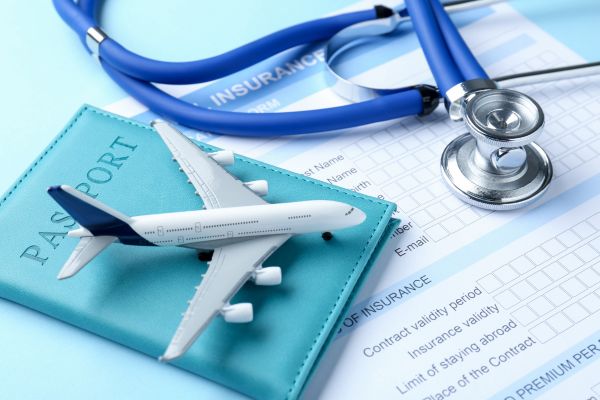Traveling is all fun and games until you end up in a foreign hospital with a bill that could buy a small car. Let’s be real—no one plans to get sick or injured while exploring another country, but life doesn’t exactly check your itinerary before throwing surprises. That’s where travel medical insurance steps in like a safety net you didn’t know you needed—until you do.
Understanding What Travel Medical Insurance Actually Is
So, what’s this all about? Travel medical insurance is a type of short-term coverage designed to protect you when you’re traveling outside your home country. It helps cover unexpected medical expenses if you get injured, fall ill, or even need emergency evacuation. Think of it as your “just in case” backup plan for your health while you’re out exploring the world.
Unlike standard health insurance, which usually stops covering you once you cross international borders, travel medical insurance picks up where your local policy leaves off. It’s like your trusty travel buddy that makes sure a twisted ankle or sudden food poisoning doesn’t turn into a financial nightmare.
Why You Shouldn’t Skip It
You might think, “I’m young, healthy, and careful—why bother?” But the thing is, accidents and illnesses don’t exactly discriminate. A simple case of traveler’s diarrhea, a sprained wrist, or even something serious like appendicitis could leave you stranded without proper medical care or facing thousands in hospital fees.
Let’s say you’re hiking in the Alps, and you slip. Without travel medical insurance, that helicopter ride to the nearest hospital could cost you more than your entire trip. With it, though, you’re covered. It’s that peace of mind that lets you truly enjoy your travels without the “what if” anxiety lurking in the back of your mind.
What Travel Medical Insurance Typically Covers
Coverage varies by provider, but most plans include essential benefits like:
- Emergency medical treatment
- Hospitalization costs
- Doctor visits
- Prescription medications
- Emergency medical evacuation
- Repatriation of remains (grim, but necessary to know)
Some even cover trip interruption or lost luggage, though that’s usually part of broader travel insurance plans. The focus here is strictly on your health and safety abroad.
How It Differs from Regular Travel Insurance
A lot of people mix up travel insurance and travel medical insurance, but they’re not quite the same. Regular travel insurance usually focuses on protecting your trip—things like cancellations, flight delays, or lost baggage. Travel medical insurance, on the other hand, is all about you—your health and well-being when you’re outside your home country.
In short: travel insurance saves your wallet when your plans fall apart, while travel medical insurance saves your wallet when your body does.
Choosing the Right Travel Medical Insurance Plan
Finding the right plan isn’t about grabbing the cheapest one you see online. You’ve got to think about where you’re going, how long you’ll be away, and what kind of activities you’ll be doing. For example, a quick weekend in Canada isn’t the same as backpacking across Southeast Asia for three months.
Look for plans that include 24/7 assistance, emergency evacuation, and decent medical limits—at least $100,000 in coverage is a safe bet for international travel. Also, double-check exclusions. Some plans won’t cover adventure sports, pre-existing conditions, or pregnancies, so always read the fine print before you click “buy.”
Do You Really Need It for Every Trip?
Technically, no. But practically? Yeah, you probably should. Even a short trip can go sideways fast. If you’re traveling to a country with expensive healthcare—like the U.S., Japan, or Switzerland—you’ll want that protection. Some countries even require proof of travel medical insurance for entry, especially if you’re applying for a visa (like in the Schengen Area in Europe).
Let’s be honest: the cost of a policy is peanuts compared to what a hospital stay abroad might cost you. We’re talking tens of dollars versus tens of thousands.
Common Mistakes Travelers Make
Here’s where most people go wrong—they assume their domestic health insurance covers them abroad. Spoiler alert: it usually doesn’t. Or they rely on their credit card’s travel insurance benefits, which often sound great but can have major gaps.
Another mistake? Skipping the details. People buy the cheapest plan without realizing it doesn’t include medical evacuation or coverage in certain regions. Always, always read the policy details. It’s boring, but it could save your life (and your savings).
How to Use It If Something Happens
If you do need medical care abroad, don’t panic. Call your insurance provider’s emergency number as soon as possible. They’ll guide you through the process—where to go, what’s covered, and how to handle payments. Some providers even deal directly with the hospital, so you don’t have to pay out of pocket upfront.
Keep your policy details handy—like, in your phone and a printed copy in your bag. You don’t want to be digging through emails in the middle of an emergency.
The Cost: Is It Worth It?
Absolutely. A basic travel medical insurance plan can cost as little as $1 to $5 per day, depending on your age, trip length, and destination. It’s a small price to pay for peace of mind—and the potential to avoid financial disaster. It’s one of those things you hope you’ll never need but are incredibly grateful for when you do.
Final Thoughts: Don’t Leave Home Without It
Travel is unpredictable—that’s part of the adventure. But being unprepared for a medical emergency abroad isn’t adventurous; it’s risky. Travel medical insurance gives you the confidence to explore freely, knowing that if something does go wrong, you’re not alone or financially wrecked.
So before you pack that passport and chase your next adventure, take a few minutes to find a plan that fits your trip. Because no matter how healthy, careful, or lucky you think you are, having travel medical insurance means you’re smart enough to protect yourself when luck runs out.

